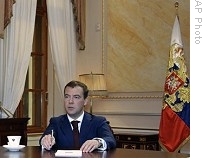voa标准英语2008-Russian President Talks Military Force During En(在线收听)
 |
| Russian President Dmitry Medvedev speaks during his interview with the top Russian television channels at the Kremlin in Moscow, 24 Dec 2008 |
In an interview broadcast nationwide late Wednesday on Russia's major television networks, President Dmitri Medvedev said he occasionally senses foreign attempts to "put Russia in its place," but rejected them as unacceptable. As an example, he mentioned "the desire of colleagues and partners in NATO to expand the organization without limit."
Ukraine and Georgia are seeking membership in the Western defense alliance. Some citizens of both countries have been issued Russian passports, in effect granting them dual citizenship. Moscow used that as a pretext in August to send tanks into Georgia, saying it needed to protect its citizens. Mr. Medvedev said Russia will continue to take firm and direct action whenever and wherever the lives and dignity of Russian citizens are endangered.
Russia will use all available means to protect its interests
The Kremlin leader says he is firmly convinced that Russia must protect its interests using all available means. He says these include, first of all, international law, as well as international organizations such as the United Nations, and regional bodies, in which Russia participates. But when necessary, Mr. Medvedev says the country must also use its military potential.
Russia's use of force during the Georgian conflict was condemned by many countries, including the United States, as excessive. Mr. Medvedev told interviewers he was the one who made the decision to send troops into Georgia, and that he needed to do so quickly without opportunity to consult with anybody.
Russian president hopes for improved relations under Obama administration
Mr. Medvedev says U.S. President-elect Barack Obama told him over the telephone that relations with the Russian Federation are one of America's top foreign policy priorities, an assessment the Kremlin leader says is mutual. He expressed hope for more effective and reliable ties with the United States, noting that Russia is not to blame for what he says are lost opportunities to have built normal relations with America in recent years.
President Medvedev also assured consumers in Europe and other countries that Russia will fulfill all of its obligations to supply them with natural gas, despite Moscow's threat to cut deliveries to Ukraine for non-payment of a $2 billion debt. Much of Europe's gas is delivered via pipelines across Ukraine.
Mr. Medvedev says Ukrainians must pay every last ruble if they want to avoid having their economy hit by sanctions and demands from the Russian Federation.
Medvedev concerned about economic crisis
Most of the Medvedev interview focused on economic issues, particularly the global economic crisis. He acknowledged rising unemployment in Russia and also threatened legal action against employers for illegal layoffs or failure to pay workers, adding that this is the only way to prevent such things from spreading. Mr. Medvedev says a list is also being prepared of hundreds of companies targeted for government assistance.
The Russian president says this is not something the government planned to do six months ago, but now there is no choice. He adds that direct subsidies are needed for companies of strategic importance for Russia, and to firms that are the principle employer and mainstay of entire towns.
Russian authorities recently issued a warning to a former deputy social services minister, Yevgeny Gontmakher, for publishing a newspaper article that examined the potential for social unrest in Russia, particularly in one-industry towns that could be hit hard by layoffs. Russia has about 700 such towns.